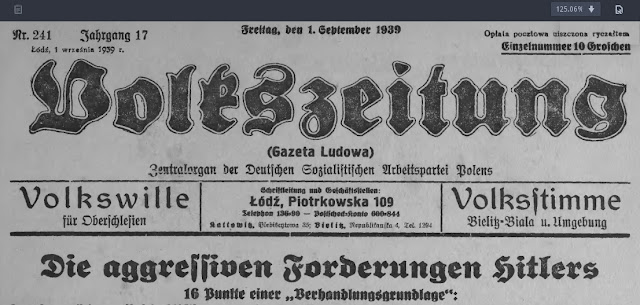The
Lodzer industrial workers, who supported the DSAP, used to live in
such small, well-ordered tenements. On the ground floor, in the front
of the main streets, there are still small groceries where you can
smell something from the atmosphere of the inter-war period. (ulica
Wojska Polskiego – the Polish Army Street)
The
German Socialist Labour Party of Poland (DSAP)
was an authentic, moderate left-wing party, a party of industrial
workers and miners. She represented the citizens of the Second
Republic of Poland who spoke German at home. There were the so-called Polish
Germans
who were at the head of this party. If we think of the Pole Germans,
it is absolutely necessary to point out that this ethnic group lived
for generations in the clearly Polish area, loved their homeland and
shared the fate of the Polish people. Thus the Polish Germans became
Polish
patriots
who, however, aspired to a limited autonomy to preserve the language
and their ancestors denomination.
The
most important press organ of the party was founded in 1923 in Lodz
as "Volkszeitung" (People's Daily)
She
also appeared in Katowice (as "Volkswille" — People's
Will) and Bielitz ("Volksstime" — Voice of the People).
Respective regional edition attentively dealt with the course of
events at home of it's editorial staff. Unfortunately only a few
copies of this newspaper kept preserved until today, which are now a
valuable source of knowledge on the society and economy of the Second
Polish Republic.
One
of the last issues of the People's Daily, composed for printing in
the night of 1, Sept. 1939 with a Linotype-typesetting machine. In
the main editorial the aggressions´ policy of Hitler was judged.
The
so-called Socialist
Germans
have established close cooperation with other Polish
Germans (the liberal-conservative thinkers and journalists), later
with the Polish non-Communist left camp, especially the Polish
Socialist Party (PPS). They
had been clearly antifascist-minded from the very beginning. In
the 1930s they fought against the influence of the Young German
Party, a strongly influenced by Nazi ideology grouping of the German
minority in Poland. The fact that the German Labour Party never gave
up despite the formal recognition of the Young Germans as
representation of the entire German population in Poland by the
government in Warsaw, has not been enough emphasized in Polish
journalism.
The
recreational area on the left side of the picture was created on the
square where Hitler's air force perpetrated a massacre in the housing
district of the German Socialists.
After
the Hitler's Germans attack on Poland, the German Labour members were
in the first ranks of the defenders of the Polish Republic
During
the war, they fought with weapons in their hands against their Reich
German compatriots. A whole German battalion with Emil
Zerbe
in the lead supported the defense of Warsaw in September 1939. During
the German Nazi occupation of Poland, they continued to fight in the
underground.
After
the liberation of Central Poland from Nazi reign of terror, Comrade
Zerbe tried in vain to get permission from the Communists to continue
the work of the DSAP.
The goal of the new regime in Lodz (the city was then the actual
capital) was political and ethnic uniformity of Poland, achieved
with totalitarian methods. So this was the end of the history of the
German Labour Party of Poland, in 1945.
The
so to say private history of the Polish Germans and their positive
role in Poland does not end therewith
Thousands
but thousands of them stayed here to
rebuild their Polish motherland.
They were bilingual and that is why they played a particularly
important role in the development of the Polish western territories,
in the operation and maintenance of German made machines. Their role
in the anti-fascist resistance and the reconstruction of Poland after
the Second World War is another story that can be told in a few
essays.



No comments:
Post a Comment